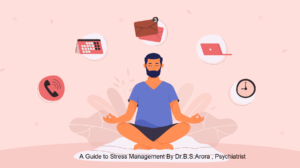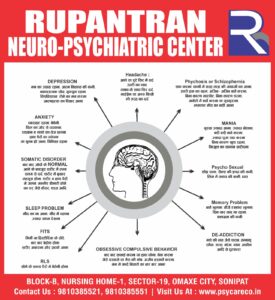
In the fast-paced world we inhabit, stress has become an inevitable companion, affecting our mental and physical well-being. The demands of modern life can often leave us feeling overwhelmed, fatigued, and anxious. In this blog, we will delve into the effects of stress on the body and mind, shedding light on the intricate connection between stress and health.
Additionally, we’ll explore effective stress management techniques that can empower individuals to regain control over their lives and cultivate a sense of balance.
I. The Body-Mind Connection:
Stress is not merely a mental state; it has profound effects on both our body and mind. Understanding this intricate connection is crucial for developing effective stress management strategies.
- Physical Effects of Stress:
When stress becomes chronic, it takes a toll on our physical health. The body’s stress response, often referred to as the “fight-or-flight” response, triggers the release of hormones like cortisol and adrenaline. While these hormones are beneficial in short bursts, prolonged exposure can lead to adverse effects such as:
a. Cardiovascular Issues: Increased heart rate and blood pressure contribute to a higher risk of heart disease and hypertension.
b. Immune Suppression: Chronic stress weakens the immune system, making individuals more susceptible to illnesses.
c. Digestive Problems: Stress can lead to gastrointestinal issues such as irritable bowel syndrome (IBS) and indigestion.
d. Muscle Tension: Persistent stress can cause muscle tension and stiffness, leading to headaches and body aches.
- Mental and Emotional Effects:
Stress has a profound impact on mental health, influencing cognitive function, emotional well-being, and overall mental resilience:
a. Cognitive Impairment: Chronic stress may impair memory, concentration, and decision-making abilities.
b. Anxiety and Depression: Prolonged stress is closely linked to the development or exacerbation of anxiety and depression.
c. Sleep Disruptions: Stress often leads to insomnia or disrupted sleep patterns, further exacerbating mental health issues.
d. Emotional Instability: Individuals under chronic stress may experience mood swings, irritability, and a decreased ability to cope with challenges.
II. Stress Management Techniques:
Recognizing the detrimental effects of stress is the first step towards building resilience and adopting healthy coping mechanisms. The following stress management techniques can empower individuals to navigate life’s challenges more effectively:
- Mindfulness and Meditation: a. Mindful Breathing: Engaging in deep, intentional breathing helps activate the body’s relaxation response, reducing stress hormones. b. Meditation Practices: Regular meditation promotes mental clarity, emotional stability, and a heightened sense of self-awareness.
- Exercise and Physical Activity: a. Endorphin Release: Physical activity stimulates the release of endorphins, the body’s natural mood enhancers. b. Stress Reduction: Regular exercise helps alleviate stress by promoting relaxation and improving overall well-being.
- Time Management: a. Prioritization: Effectively managing time involves setting priorities and breaking tasks into manageable chunks. b. Boundaries: Establishing clear boundaries between work and personal life is essential for preventing burnout and chronic stress.
- Healthy Lifestyle Choices: a. Balanced Diet: Eating a well-balanced diet provides the body with essential nutrients needed for optimal functioning. b. Ample Sleep: Prioritizing sufficient and quality sleep is crucial for mental and physical rejuvenation.
- Social Support: a. Communication: Sharing concerns and seeking support from friends, family, or a professional network fosters a sense of connection. b. Empathy and Understanding: Building a support system that promotes empathy and understanding is vital for managing stress.
III. Invitation to Stress Management Techniques Workshop:
Empowering individuals to take charge of their stress requires practical guidance and a supportive community. We are excited to extend an invitation to our upcoming Stress Management Techniques Workshop. This interactive event will provide participants with:
- In-depth insights into the science behind stress and its effects on the body and mind.
- Practical tools and techniques for effective stress management.
- Expert-led sessions on mindfulness, meditation, and stress-reducing exercises.
- Group discussions and activities to foster a sense of community and shared learning.
- Personalized strategies for incorporating stress management into daily life.
Join us in this transformative journey toward a healthier, more balanced life. Together, we will unravel the knots of stress and discover the resilience within us.
To reserve your spot,
To reserve your spot click the link https://bit.ly/3Tedv0K
Fill the form and send it back to us .
Contact us at 9810385521.
Bottomline:
Stress is an unavoidable aspect of life, but with the right knowledge and tools, we can learn to manage it effectively. By understanding the intricate connection between the body and mind, and adopting proactive stress management techniques, individuals can regain control over their well-being.
The invitation to the Stress Management Techniques Workshop serves as an opportunity for individuals to deepen their understanding and embark on a journey toward a more balanced and fulfilling life.

Contact Us
Contact Rupantran Neuropsychiatric Center for comprehensive mental health care. Our dedicated team offers personalized treatment plans for various conditions, including depression, anxiety, and addiction. With compassionate support and evidence-based therapies, we prioritize your well-being. Reach out today for expert guidance towards a healthier mind and life.
